Among luxury brands, French fashion label Louis Vuitton generates the most visibility and passion on social media, as other true luxury players continue to find their social footing.
NetBase’s “Social Media Industry Report 2019: Luxury Brands” reveals that many luxury fashion labels, such as Chanel, Gucci and Prada, have made significant strides in their social media strategy. Luxury brands also continue to enlist influencers and celebrities to reach new audiences.
“One of the biggest surprises during our analysis was the impact K-pop bands have in the luxury brand category,” said Mike Baglietto, director of product marketing at NetBase, San Francisco.
“Many of the top 10 luxury brands in our report have increased visibility as a result of partnering in some way with a member of a K-pop band,” he said. “K-pop bands have millions of followers, and their fans are extremely passionate.”
The report is based on evaluations of 100 luxury brands during 2018, covering the categories of automotive, beauty, fashion, high-end, hotels, jewelry, luxury ecommerce and retail. In total, brands reached an audience of more than 932 billion social media users and earned more than 283 million mentions.
Social strengths
NetBase focuses on brands’ net sentiment and passion intensity, which are used to calculate the brand passion index, or BPI.
While net sentiment reflects a brand’s ratio of positive to negative sentiment, passion intensity captures the ratio of strong to weak emotions. BPI clarifies whether consumers love, like, dislike or hate a brand, category or topic.

Chanel, which partnered with G-Dragon in 2017, has a BPI of 72. Image credit: Chanel
Luxury beauty led all categories with a BPI of 82 on a 100-point scale. Beauty also scored 94 for passion intensity and 87 for net sentiment.
Rising from second place in 2018, Louis Vuitton ranked first this year among all luxury brands with a BPI of 80, more than 13.9 million social mentions and a social reach of 38 billion.
NetBase defines “reach” as impressions from original posts by a brand, as well as any replies or retweets of original content. Earned “impressions” include mentions of a brand originating from other sources than the brand itself.
Fashion labels Chanel and Burberry tied for second overall, with Gucci, Mercedes-Benz and Saint Laurent rounding out the top five luxury brands.
The presence of Chanel and Gucci is particularly notable since neither placed in the top 25 in the 2018 luxury social rankings.
Gucci also dominates conversation volume in the high-end category, with the fashion label being responsible for nearly 20 percent of high-end mentions on social media. Nonetheless, Gucci lags behind with a BPI of 49.
While L’Oréal Luxe brands make up more than a third of the social conversation around beauty, French beauty label Guerlain has the highest sentiment score of 96 percent with passion intensity at 100. Meanwhile, Estée Lauder has the most negative conversation among beauty brands, as the group is criticized for not being cruelty-free.
With more than 19 million mentions, U.S. automaker Tesla edges out German automaker BMW as the most discussed luxury carmaker.
However, Tesla has a net sentiment of 18 percent, well below the category’s average of 56 percent. Although Bentley Motors made up less than 1 percent of the automobile conversation share, it had the category’s top net sentiment and passion intensity scores at a respective 87 and 98.

KOLs visited Cartier's Ginza pop-up. Image courtesy of Boluomi
In the hospitality sector, Four Season Hotels and Resorts has a share of 39 percent of the social conversation with nearly 2.9 million mentions. The Peninsula Hotels and Rosewood Hotels lead with respective net sentiment scores of 94 and 88 percent, despite accounting for less than 2 percent of the social conversation combined.
Elsewhere, jewelers Cartier and Bulgari make up two-thirds of the category’s social conversation with 4.6 million combined mentions, while department store brand Neiman Marcus draws 47 percent of the conversation around luxury retail and ecommerce.
Influencer impact
Luxury brands also benefit from mentions by celebrities and influencers, whether or not these mentions are organic or paid placements.
Earlier this year, Louis Vuitton used a new form of influencer relationship to cater to a younger generation, as experiential leanings become more important to brands.
Model Karlie Kloss was the special guest at Louis Vuitton’s runway show during Paris Fashion Week, alongside 17-year old YouTube influencer Emma Chamberlain. The label extended its relationships with the influencers through a series of content following the show, in the hopes of catering to millennials as well as Gen Z consumers (see story).
Another top 10 social brand, Prada enlisted Chinese singer and pop-culture fixture Cai Xukun and multimedia artist Cao Fei to create its fall/winter 2019 campaign, “Code Human.” The collaboration balances an appeal for authenticity with outreach to the increasingly influential audience of young affluent Chinese consumers (see story).
Chanel also recruited G-Dragon – a Korean singer, rapper and fashion icon – to appear in a short film as part of its ongoing Gabrielle handbag campaign (see story).
As far as influencer authenticity goes, are the influencers simply reposting what the brands want them to repost or are they providing their unique angle and truly showing their personal passion for the brand?" Mr. Baglietto said. "Alignment to brand values and overexposure are common areas that brands should consider when developing their influencer strategy."
{"ct":"z0jfwKgOg50WIjySW8Iywtr4cj4LabMjHHv5BZD1zuvC5VfEbZp29E\/b\/PQCc59dJeigzU6syZyVSHV\/jjlrHbwuoc+GTgqZNXM4WdeZjDRJquzKwXewuV9q4rkEuqSsYu4h62m5oD5+c28n61VqED5QSvlp7GocviHzim5sfi8O3RtrEKZwYHTaPExi2DU8L90gT9bzTfj6BRIKKsP4UhLKPbqQT0ft9po9tjYDRQMYhYe2u77W1yGq\/5UJZbBzCe5RPBnSs\/Jkm9gln+2LkPpu\/+Vuu1P3rHYnonXlqpJt4D85Rx2WWJKj7ue4GzeVZNjXjYlYdDJ0RXKxXoZWG779w8Z5W61wBKLjSpJHXwSRLfYhGEydHNM7ydYoVj98D07naak9R73sx0AzRcGykJttpA9v6W5yF0CB7D+3L2SkKugncrTk+4LArhRom11ZfSUAWNtc+cQSMxPoCr+9J6ZnfodwV7gTm7LtO8No3b2EFnxRcjcCog5Gq3iagF2gtLjWwcN6H\/7Y9qCW\/iFyVyfPNyx6zJnN6tMGA2B1Rtn9uDnbaWOZ2HPIHS4SAGns7yKa8Om7H7K\/DMVvY0Zoiat42oSevpL\/J01E85WmSVn2hTdGPXnzAW1k5o\/331Lu2qlQW2PCF1K+rAWyPXPD8XFehUqblmrpU3IQTuhAzY7ngY+\/74LkUNBUWRJ0QFEuev2ighbpi\/K4cRIMMZjd5rpPJV6ShS40ElOCNYthStRh2R6M1xjNkId4m+SBeANU4c\/YgOquJDKRc\/7HXS8wP\/Q5wfgrOOzmzlE4LoYPy0P+XB2beBrQ7\/DZXvwfvSUdGRfoBvyo8IQl1B3cr9rdvetIwe7S8kaQBzStPIEN\/b2t9c+GWi1f0gG96i8QnlXHpkM7vpb9hr6aO5L4WPePcOilrjcrcVTc+8VjdD0XD0vjihwdBwksITf0ouSZ7IDN25fY\/oN\/NUpmHDvgtgGiTXkOCPSbAc6LK7CJgeXxxt0QZM\/vluAg5VJS\/shis0\/cBX1+\/kziyDLia5GPQqPuzJXS0ZwOXRAhrlhXKwY5yplmpVfMgT3QHYjlBtYIqJVT5Ygz3mzLs9FjnqAHxUKU90eYCPfT7J9ZzQKeUCUhsE9ZyhgGd1It1LgHurPxDzwGnLln6byPZziZeeP28DmzELkNG992DqxM+GqkUuuVcG20SMX5DpA4XTytn6rYOLMJ8qQHwqR7A0tz+QH5AOSWq7vT87+39o0F1CwdYs3ic1HyF7JcPGKC0YPH3bJ+0MZaCxp\/Pl49BRTuqEGd+cWKgeX9Y8X5S8hng05hhoKWwBYgY\/8Wmn1rdujf3OwdNE7Nt2mnU+H7tqNCi1CUOSnNCA1x9focXhiGRUBEaITZ+rgGIgHLfTJe4EYx75caP5K\/K7MbZzy8AbcMPXVYY1vOx2lBAUz4ZYpdrtZAuB0ZZAM+UkjSqbrEwkq1exk0hrahPW7M1x4zKfRnZiIMULFGBSNCleRLeor19iZFZoBZc1RtD0HOvOTlh4ik\/Fd5f+rB\/gtOl\/V\/vOUT8nZwjQGCBgDHPvUxqRT6zOnt67wQyh72\/uRQdcypH+CKerlLJK5Lxcwm+72Ei4oPdXO\/r0xIeJKh+ng3H+335ic9lE7T56HeyRtbxtumSws61YO1OVAxulALQ90TixD1tjqFzUGSXPrEoQIEyTzIQRjzVeH9GK\/7PEW2cAiAmFNfCw4MhgEjHv70j4tgcAlYuqyA4CJVhSN9wkOf0V+lr+hl9AUK2kx23cqyZKQHAJVjcnk52n3WIxN6zZLE6WgF+t2+qW6l8s3mcxN3nVFoZGkWM3TX68FLvS\/s+Pyflm4Q6DIwOj0e076naGSC46syygm2Mcu58cgVAa7SlralqKb4RO7dmJ+QBR29IvZ16LNFvC9\/fsffonTy+\/HRXoDoa3uejdlnTTwBH7K9iEqQpaTVD75Q\/EnbdlZqV2RC97\/eV7RV\/LaE8Cq+qPDl+tHhRpduo0gOubbDOq\/K5pOo69qMbcSNTfM7RREJMCEFw5IL0vbc176jim8CZr3X7Ptw241UdxczEA9CMKa+iPsBL2vyDnt2+SVYFrd\/DFWhVs+VduanOp3C2enXKIpa4qHtKBx46WsU\/J2b9DRma293eDfvxIJKdX6FoVzRaZbkYIUAXYDobpYmkjwnYwuNrPLO1NsTzYyHyRoCALcIXCCSJSjKGoagJooCKDMOPIUsmlu9lNVTMomijT7nv2StWLCBrTugZF3cdVC0xWCiqNa7v9m6guNvVWs9FqlcgPhy9yI8H1a3TxVpYXwmwtZx\/+LKKTa0c13FoxYTypUZZWN8hz+CqhxVsxgSeHUBpyCOj8qibXRw\/+IjcZjKaPXJX+tAOWXGztidGpWo1XLZzDUzLVKEza72Gv7I7Ibt2bp7iz5emjHlieLYgQ0DT57Bbw94JJgj\/HXGgJcU6B2b+Mxq2AXUoUC\/j5PZUVLT44FbE25Tt1p5T4jnfFb1dIr4NYFmmIvGSl0Myr2OZcJYb5E6ZzZAiTfS5u++B4CYdYJnAcnRguOEGXhTIpq3ejrCx6aKnz62dhdBT2J4s28G8EbAC484tjc8uAY8keGoZTKGA1uj7Oh0Qti7tJb3pCy0uSGE91ILy8xvWUW+SWKfWQxQGxN\/KuXTXPXbxoId3+k8HHsd26DuIJIWe2FexZZz12t0z1NPXlXNH5GHpUF8iGaBrvrOBx4eIbUEn1t53pZjWCPKLMvANwQCpGOD8Pmgtx2spEb071yBzN3eoej9LbArKOggiwtf2HPTi7f0s1ax0Iuuul5l3oqJTf0b23q9OJn1zpOgE26qYpbb8D6sV2goWpBVsAowUJaN2PZCg8zqUF98XkT5hwM0uWiHw+yQqbygkOFFE8z8DDCQFb83iBeA\/8XCJX1uWHAfxSBkJz0mNAxFu6L55ZKQngb9lVB0gsKETjSfMWS4MczjjodOHCb5QEVt9bIcDyBsuJ8UgDccZnfIPZpawvwmSASdUqhfVAuJaP76OFvB+94OzStgoaYc4CCJoyZPknvPLgFk8l\/wznQGgl0ugHPhkWMjXquE6iWKwWnDPiVOPHL21cy7YBLbqdR5X3aPivXbCm0YcbcFQRJ4q9tNIknG7qtNKD332aRyXKUwMS5OkTRowC1E5+yh7olhjwSTGop1qOjZlT+WstXgTZ5oz1+gqvdxicqXcOXzS08v7AzzsZ32mlfJxEN446r6p65ivWLWNGhTpJJ3Gqx6GCTxQpVLXflYDOKgMv+8q1JY01qA1L0sWWN3Rc2Dzc5DiFQkEjXKyZzoVEZAVCU1yBOAqSwFnR2c6WIxIozoYkDIVyuMjcTWF1tEUq6A0FivPAhEjyKZohScyshxp8UUl1Xy9iy+9wWH+I6Sqqjv0934whzg295MjZZsS2ZQDap2eT+DFTsfNRv5ZWU9qA\/dxW5Vomi8id0Twg5zgdfeCTTnf\/rv7sw3yqddDZHk5zc1ZapUdqsmjADgMFaQx+fQrI5YVhKA\/yrPrdil681fE+EHZYpm6MNNybaaZMA6TrSUTXSv9+NOMSRKqqrXNG2iFszQtzka+xkAdWi0UoMS8uZSeAwLR0gu0EoFnB5sDfDrGdHMRvRv4QvmWblVC7hmPHKphlcrt+DzWNermn4USK6kX1fVP1Hv0ub\/qWrvDv6M1S+O8Y0PUA1w7d6O9hz8CgM+AVsmc\/wwL5MHu9Jx9HVAM8FNJrI\/pS3QT73OZ9CzLqJfFuQsUgmLKEm10o2NgIHINQ3Ljxzvr72JdM+jEz6BUlQ8UkH3PazOd+wPABln5Cp3HzYyI8x8VpFaOJOGJn2XS9DqKHArUnQg1b9+MTe+bSBZzJuM+f0oJhalVv\/4J9o1CaPVSy5KAYqq47z6JPsE3KsRZUnX\/qDPSvEL0lnGjdytRNAFzqiw40sm6y2b8gUOp6SIFQ3Kf8zF11h0FOSfqHa6nfHB73VVchhmFjHSA4vbsaCYUklEJb6IdZ5dfAVQcJ3ZCVLW37OctTwsE75KNpuBkxnRZZNgZxQFT2tvlyplR3JAl6xh0SDe8+kTrLcK0HPIsmfaq0\/UdS1jinbQ6jUV+OhqnFMxyBa042GEkUAz+apXY9zTiCw5mzJ1Z0gMH49tgU3Eht5MoDFS6vtGM9\/DfYALZUyUwoPOBZGSCc0r8iqdLYLYrTAGPIWivNYdlpZPUrZNY0QEkhLQJC2DpbePuNr\/GxyQWwzBpY2btX9XbUyxtbLLw8DTnQAIzEPtlZPPfkQU0FB63vrJ\/iwLgoq1rJWZHqCJ7VW0yn\/043y2vQaE7ZTBBRsJ62ETfVnqdcdaY8TkFt9Z3R3cg4I1CLRKZ7G0j4DWXx4Uah4qyc4Xsb4nNzsgz8sg\/uwAndQpQlKmEnzb0E\/u1ZeKRQhVhnHQdsPYtKOtdtirrCiD7EGxmkzWc97UInH8oUkTgMty4VJiTPU1tsoZcq5DomBcDHVFEPSUasf83HhAXIu5hOOlYd5K8HYzatxzhllAhuMpwyz0SMAr6FJTIHw1pBQdUy+5hAqS694zsR2btTvjDVESEGqCQum0gO28n50YwHWBrEjPomr4ouZgrLgjnlejEkk7bNe7g\/HKgwYWjRbkbI6kzeWkXB8nr51hZoGZXythRk+ltzIctpG5qQdzuM4iUFsK0i2FVrhIuOooqsoIRc8\/cKKPqMau7IpjAD0+z5W2ih8qwRut7yywLwQwbKBsmVN1TG0odzeTo5cu470GeYsoj1ZPzFUSczq\/M3ouEI9fUOnXvLw3az373ktvae6PxcvNLVZVGm4Gk2ruFULPZXih\/Qtu8SofhP8ZOx4ynLT44VRsKylmW\/Z87hTqEi\/SX04S6B\/\/4K03nq5qbfJQtEhdXvFRvKzD3VIRr8D9uhh0OKvMgkSSpSZPZsFq9u12QyPdAO9vZkbcS8rKEbxjEsvkQZxD8nr\/t62vzuw4+S\/jjBCxiugrveYq+\/MgkuyQNCYuygnjl8QXFVoW2JVevkInltv+ZgFZpJw0miBl919fGx7YlBTIGCIcACgk3Rv2HMiPoYY+f2PAQ+y7IQzxG7XfhWGSgjctylM4gS5knmY+\/s1AorCpxZ\/qu1Po4CM+N+CZAteUDhFXF0Pd\/iiQROCeon+D3JVCSTM0XeNgvnOUZpzfFqw3DFMNCbSCijO1+F5XqbBrOJksMLyJHwyc8toYSfc7g54McQDYiCP9Hw3v7fWlAZBIY98l4gHO0bKvH\/dEPPlrOYIjm+WX8+\/9kh1rgXHQZsMi9MCd2w87dBzkHNWvGTHs7inU\/wfOUUQLQl59eh75wqaSO8CqGUy3ER2vXOSYUVHU6lW1D9gvvvjmS9Gfkzmq0N7CNq5t\/zJ1oumuBujdKaoRXbymfJ\/M4B81huLLtV\/MDEItlZ7t3PoT3Qr\/n3W7NT1QEZd5s1e51hHG6j6MV7eUFBJvHn2\/wiRVpq2IbWWjvJ+cuxCWw0xfZa2HS4b09tG5RYw+BmTI6evxB8RoHhJQhw9VR0xiKGv74JXlmNpRWhwGLyuCxqcb7yD60nzvzhdLJmRfXAXnve7UqzSjiWrIO+fm+aiRVl0nuFRdpCaYCSwPeqjiEDkZUsYuVa9XiBPraxu+Ed62X84cWiuZpqGCC0rukpvT9l\/p36IiH90EyJIPxEKlp5e2tzAH6VOK6WvtzhMjp0R4m6yyfxi2gKlPaYFvdc79VOOQc20Rd\/dg5AZDROjUl9zB5E39yTRFFVNvumTVds\/cDLCq0ubtjeQpmVt9zUI48wzdgKnhDLSAKlUW0zHroalPW2GNWHucrSA4I1EL2FFMgAuRpcCbNJ5Um9xJDBLiAeaNaEsZUM4jHeKIemMXTvAM\/GuNRYNFPvv\/VqV\/fD0lnpEbW4OIENISqM63MhELq\/s+SUHnznk3fbBtJjC1fyMw8tB0nS9RmedK4Dk9XdWUOSfWaf24k+AfKRMBE8+VFouG37E+XqrXD1mFmEerKPbX8v3q35sP6ZaMrTU8RZALaX2gAoaveM34Hce9ViW8I\/gOLOrN5FNEa+U9YCJdWBoIiO\/uX3HhURca278rTP\/BYlJpUgnv0GinfGPID3hoCG5qOr1OXWaAC03YPM33UYmPRnPyuvUkH3\/GuPAJzz+vLnmjGcRkgFtpVVU1WLZ5JLPgrw0Wlllo8Kc83m5CQ8T9wE9BoK\/xUB6SnEqUMQVARMGyUviL7Kf6vonxLnQmWqzuxr1WQ0LhrpYmnPzwzLMBGhwqtoE683ztxPIQFGzYiTU1CQa9+UD233PuKV4sO9AwrVfCRNKvOu\/AqaW9O8NXEpyMewICSwuQ1ejeV+SM0UIkadC0orZn9b\/9KRTNlZQPw\/SHD5dEnytfUVZwdHXqukz1QisSy+Apzk0buPOy9kCllbwpYD4PIl6ma+qZ1t3sXR1UnqhkxBvLA+6M0K1TGxkMMKQ8cs4GxWSgG2nvchIw4JvW8aJwJhRTxS0EHtJX7M56\/LOFUKuJb4uihv40Lgkhs72jCqCQUe2XQOHElOP2gQwZJ9rwR\/I4MsLcm3TVTDT\/ok7eIB4lZQBusYfdhJimDTdwrYXbj9QuZE0IUWrqpLz97TmEKu2epLbrt6cnafRYfxgSYxSKKDIBGmnDBQmrD3pExE4GtEwsmvgfVq0OXUzNe18x1IsHXGp4G\/vjVsKtMgrnIBp1ydoyt9y3TongQzWwEoxy\/Vi14qyH4sWreNsV51f88RCAXishWV+fhbytJ8N4sVdx1VLDXuLtIzQWU0TWjZNFXEz0JRYyrS2up0ShNSMGV4uNGDL0TtFl9i7Kh0vosXL0Wo5oHplgNHnnlFUvE45qqSyxlDcHIAYakSecDtxHgJ8aGuOZ5OYAcECdRZq6Jiiw890PchhiYhj++ZvLrL0KMO7Pf4MxjdhpSybJGhJOctF\/7sEkk3jAQmSRtb7FVLMDHziuEAfofqBH9a5+kVaq46VlGrsolDgcR6j4AnlWZJjO+dfpIFarBJ06fM2WkrVSWdcwE1LJVG3ZBSyP2j3ZuVID5l9I6ZVYZcwybf5gdaVvXrVkIE\/uLXqzzL8sFQPqhAxkfJOI2fd6R9sXFzojELGuf3NjITvAq7ncyS6w8u+9PbsyBBBXjpLusQfbJP8mYMLv8Zy76z3QeaggJRyC0\/KM6LuQmJNOjNsv+r0wWIRAq7\/flN4mIIm6tJunFxqQyIUhHXEwhXQUW8wnariuSUDGgZZDtSMhm0s6v7\/j667Bj\/cAFWNVcDbyD3ZwIHRQSaBV5I6i6Pr7Rr0ZFaAl3PzEPzaYfqF\/Y76P+giI5DjrCWgEBJFmQxJpEgFWhV1e7lH4PLB0HhqvFm8KBDtYwTZDC5nbzJL0e\/TvllE2JZHBiOPCc3PZvRDLfn7BZQGYyRJA+uthjHMceeQhcFk6FITz0vQrjIWQpB1yx4DCrplzuE5GAcqECzl510qr7YuW\/Y1p7seaXBs6S\/E8qMHCGd\/6oaw3dfmfkqUnBDTsmC0pC2hy5Kn\/38s8xoSxPxReUx\/x\/bBXBdpW7wPYI\/6oWeyzD+xACYBnUzHdGxzvd8fgHKaDfqAab95O1A97XZkG1YBSyXLjmkkC37vcLTEMI33ko6CIscPBZr1ui4xn6HUO4J7iZRejNHdUI\/2QpgxpccnT1J+qm\/PryWkyepoEBzworBE9rNP6dqmnQc+qzYhKYWjIMJzJMGxqQm92D52MKsoMqCNP1KpOVRSl8qJNbGtcx7juA\/DzICoEsO+msAX4JIpIrc3oyUxWnFEO1ANY\/P3pAX9tEj\/v2Kt8r2QCdeGdcTzQ4e7+qIwOUvImaVi3QRfqFpNw1\/f7aooQyzP\/OfyN0QW65msN1kE9MCObjEJlJ3RyWG9vvk8\/pZhLrm\/W1ZbGK70TCAUm5ZSxq3mM1F74OtuXMBk0nmvZ0j1hH7qCy1PNIvWwDjd6wPLZYAuiemhHKUlsCs3v2wPbAeKaFNCE60vDIRweQmWk6qy9QQ3N7lLt6GHAPKgmqxaKH4cQarw6LCY++TjpSYhZjpwMtkf0YRt10ln4uQGiOGw5CwmT4Dvp09dwkvEY1dlFbOzZxR5jVz5+NjSQVGMDRVDtr1sTUkaTo+4Pm0OmYF\/dvwvhXIfVTOY6kAEdVtTr3ocMiyl327BfA6t5aXXi5Vzgm7\/GePOEleRXQV7yKrOn7ZsuWb8fOyO9aFHWdgIv\/FLyXTC3FSfxE0PJelVqghJY4vqGqxi2gu5BcR1uWiGWx7RHs68wQ0Zc1iFIKGzPkPWCgW5VeKyty2DSduPjpAUnA9mcxFerBuI7xpD6opGVdzTmE+DaSiPvU0kdy8Geow9NHgDxMXas10KyZ6RdcsspDDebGNg4e0woZtwsQfRd+I7CGMTNH8cBNZk5cK+ZCUP1qI3R2dED1CtEs7YaMUsT3j7VgvyNO95i4jph5hfUuiN8T78n2xk88FxhYrUHEQropMqyUCorUadjM\/rTP6FLnxo8GrMzXu2qOn6tsSMNIufiyEHkK9EULX9knDRedu+dOIEeTEtN1oti5t98\/kPqyIpxJDQFeMMUHuzXZrdVly77D63vgZejbrB\/qwHEDMy8syc9\/qvlyt7n0sUuIzmirv+zIY1imWuyFKzYo5S0SbE+eVie\/jA9vxzbySsLPkd+d2+PrQwLCAGIzw\/Be5LrERVLUCr4C+yKAd9s3T73vm+d4TI7msEdAZkv\/H3tT4+hg3TYcBiLjKB9PhOb8t4c9IALTxvGg3AU6s+SwSSHunR2v3qsRy7iRUXtXqWFgce2oyGKrIPDi9QcsvlAPirp6qMXhYnsh59LXTaM\/HVMwPhujs8fECiXH+u3kcq96d+6RqRtxM5Gl\/Q+MeTCm0DhvU5HJpA6CTA3gB4G8h7c4tvUS3nWms9yUpMwegXuYTryD0BQY5ma2RJfcppyK4kFZ4gcJyKPVb5PJA9bFa7WIwitEztbYIH17GYzlkOzkq3vwn5u2U2qW\/cvwgQPHn6XOtoMWtmup2xtrWniCEISzVl647LOXMaR6FGWjLRIUXV2unK4+oJ5n6YsK63s3Xl7XQoSAnWj7rciD57UMtJmgtT1igKgb2sm03tk4\/z0kAVMcbQtcIE0co\/ZBeEuda2HIKi95g8BpoODnWbYY1FYp8cCCp7E6yDmwE0qTWFV2ooAgTTbeMbb84Av084A0jxG\/NVKUJ7DVFk28Esd+Of1w5dD\/\/6cTYGQNxqUxpe7gG1j6Bub73lzQjkpyAmmer5zB4VDjl5XmbWB6GQDfn0semKicBIZ+iazHQuwE88q1UznE2y7U+xuqgRq9W0QJFpVceQ2ZU7xZR2MIEKD2Zy047tPvXgxqJN8xrBkbD0WBIYwayzESc9AikBYAtXW\/BuzYKyVJ+vzOnuphX1xJZtoTQWMQ0yTd63T\/dU6vuI5Du8PXJeUjUdEERJklv1FUJ8+dZeeMyFiODQ3jCUln6KX68KicT3BaCQO+r+Jgvm3Lu\/fkKUuxvlND0X+56942HfSsQcNpPnB8SgqcBxCUG6xrxUGC07NUwT\/qAQdFsthvkl\/BnOHuTu24FpjS2eAy8CdTMoq48gLYeM3\/NOYMscaRDDL3JGXap+iqDSk\/TXI\/xLxq\/9cefNH2\/o2PE4WituD5RlImnYrCMxL+hxmrZIxJ81aRNkoWTrmD6dARgE+oFt6u3DOvmFmbEdBMBjwsdCQt20Q2HJ09B+zCDS59BIHlw3BJLvZUTZxfISK0v1lB9tcvIPCT00jdg==","iv":"5b8692ea06019b8baaade58635a14979","s":"25c6601a99ce8596"}

 Louis Vuitton works with YouTube influencer Emma Chamberlain. Image credit: Louis Vuitton
Louis Vuitton works with YouTube influencer Emma Chamberlain. Image credit: Louis Vuitton